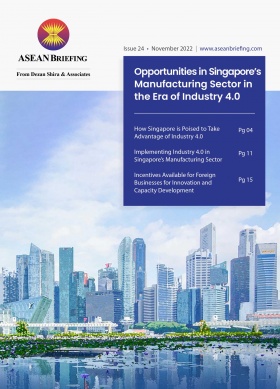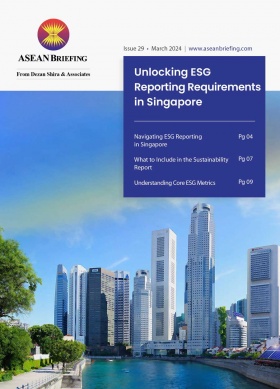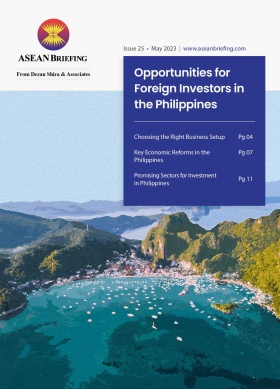A Guide to Taxation in the Philippines – Updates for 2024
The taxation policy in the Philippines is chiefly governed by the following Republic Acts:
- The Corporate Recovery and Tax Incentives for Enterprises Act (CREATE Act)
- Tax Reform for Acceleration and Inclusion (TRAIN) Law
- Article VI, Section 28 of the Constitution;
- The National Internal Revenue Code; and
- Local Government Code of 1991.
Tax structure
The country imposes a territorial tax system, meaning only Philippine-sourced income is subject to Philippine taxes.
Corporate income tax
The corporate income tax rate is 25 percent.
Domestic micro, small, and medium-sized companies will directly benefit from a preferential rate of 20 percent (businesses with taxable income of up to PHP 5 million (US$85,611) and not exceeding PHP 100 million (US$1.7 million).
The CIT of 25 percent is levied on net income on all sources. Non-resident companies are taxed only on their Philippine-sourced income. Domestic companies are taxed on their worldwide income.
Ease of Paying Taxes (EOPT) Act
The Ease of Paying Taxes Act, also known as Republic Act No. 11976, became effective on January 22, 2024. This law aims to modernize tax administration and streamline processes to encourage easier compliance for taxpayers. Notable changes include the new classification of taxpayers.
Taxpayers are now categorized based on gross sales:
- Micro: Less than PHP 3 million (US$51,379);
- Small: PHP 3 million to less than PHP 20 million (US$342,529);
- Medium: PHP 20 million to less than PHP 1 billion (US$17.1 million); and
- Large: PHP 1 billion and above.
Minimum corporate income tax
A minimum corporate income tax (MCIT) of two percent is imposed on the gross income of both domestic and resident foreign corporations, on an annual basis. It is imposed from the beginning of the fourth taxable year immediately following the commencement of the business operations of the corporation. The MCIT is imposed when the standard 20 percent CIT is lower than the two percent MCIT on the company’s gross income. Any excess of the MCIT over the normal tax may be carried forward and credited against the normal tax for the three immediately succeeding taxable years.
Withholding tax
Dividends
Dividends distributed by a resident company are subject to withholding tax at 25 percent; those distributed to non-residents are taxed at 15 percent, provided the country of the non-resident recipient allows a tax credit of 15 percent. The withholding tax may be reduced under an applicable tax treaty.
Interest
Interest paid to a non-resident is subject to a 20 percent withholding tax unless otherwise stipulated under a tax treaty.
Royalty
Royalty payments made to a domestic or resident company are subject to a final withholding tax of 20 percent. A 25 percent withholding tax is levied on royalty payments to non-residents.
Fringe benefits tax
Fringe benefits granted to supervisory and managerial employees are subject to a 35 percent tax on the grossed-up monetary value of the fringe benefit. Under new income tax regulations, fringe benefits mean any good, service, or other benefit granted in cash or kind, other than the basic compensation, by an employer to an individual employee.
The benefits include, but are not limited to: housing, expense accounts, vehicles, household personnel, interest on loans at below market rate, club membership fees, expenses for foreign travel, holiday and vacation expenses, education assistance, and life or health insurance and other non-life insurance premiums.
Fringe benefits tax, however, is not imposed when the fringe benefits are deemed necessary to the nature of your business.
Branch profit remittance tax
Branches of foreign companies in the Philippines, except those registered with the Philippine Economic Zone Authority, are subject to income tax at 30 percent of their income derived within the Philippines. A 15 percent branch profit remittance tax (BPRT) is levied on the after-tax profits remitted by a branch to its head office. After-tax profits remitted by a branch do not include income items that are not effectively
connected with the conduct of its trade or business in the Philippines. Such income items include interests, dividends, rents, royalties, including remuneration for technical services, salaries, wages, premiums, annuities, emoluments or other fixed or determinable annual, periodic, or casual gains, profits, income, and capital gains received during each taxable year from all sources within the Philippines.
Improperly accumulated earnings tax
Income accumulated by closely held corporations with the purpose of avoiding tax attracts an improperly accumulated earnings tax (IAET) of 10 percent. The closely held corporation may refer to companies wherein at least 50 percent of the capital stock or voting power is owned directly or indirectly by not more than 20 individuals.
The tax base of the 10 percent IAET is the taxable income of the current year plus income exempt from tax, income excluded from gross income, income subject to final tax, and the amount of net operating loss carry-over deducted. Corporations excluded from the ambit of the IAET include banks and other nonbank financial intermediaries; insurance companies; publicly held corporations; taxable partnerships; general professional partnerships; non-taxable joint ventures; and duly registered enterprises located within the special economic zones declared by law, which enjoy payment of special tax rate on their registered operations or activities in place of other taxes, national or local.The criteria to determine the liability for the IAET is the purpose of the accumulation of the income and not the consequences of the accumulation. That is, if a company allows its earnings or profits to accumulate within its reasonable needs, then it would not be subject to the tax unless proven to the contrary.
Personal income tax
The Philippines implements a progressive personal income tax rate of up to 35 percent. The TRAIN Act, which was passed at the end of 2017, stipulated provisions to reduce personal income tax on all taxpayers except those in the highest income bracket. Taxpayers in all income brackets below PHP 8 million (US$142,900) will therefore see between a two and five percent reduction in personal income tax rate from January 1, 2023, onwards.
|
Personal Income Tax Rates in the Philippines |
||
|
Income |
2023 tax rate (%) |
2024 tax rate (%) |
|
0 – PHP 250,000 (US$4,279) |
0 |
0 |
|
PHP 250,001 (US$4,279) – PHP 400,000 (US$6,848) |
15 |
15 |
|
PHP 400,001 (US$6,848) – PHP 800,000 (US$13,697) |
20 |
20 |
|
PHP 800,001 (US$13,697) – PHP 2,000,000 (US$34,242) |
25 |
25 |
|
PHP 2,000,001 (US$34,242) – PHP 8,000,000 (US$136,972) |
30 |
30 |
|
Above 8,000,000 (US$136,972) |
35 |
35 |
Value-added tax
The 12 percent value-added tax (VAT) rate is imposed on most goods and services that have achieved actual gross sales of over PHP 3 million (US$51,379).
VAT exemption for exporters of local purchases
The Philippines issued a value-added tax (VAT) exemption for registered exporters on their local purchases of goods and services through Revenue Regulations (RR) No. 21-2021.
The VAT privilege covers the sale of equipment, supplies, packaging materials, and goods, among others, for a maximum period of up to 17 years.
What services are subject to VAT exemption?
The services performed by a VAT-registered person that is subject to VAT exemption are as follows:
- Sale of raw materials, packaging materials, supplies, inventories, and goods, to a registered enterprise and used in its registered activity;
- Sale of services, including the provision of basic infrastructure, maintenance, utilities, and repair of equipment, to a registered enterprise;
- Services rendered to persons engaged in air transport operations or international shipping, including leases of property, provided that these services are exclusively used for air transport operations or international shipping;
- The transport of passengers and cargo by domestic air or sea vessels from the Philippines to a foreign country;
- Sales to persons or entities who are exempted from direct and indirect taxes under special international agreements to which the Philippines is a signatory;
- The manufacturing, processing, or repacking of goods for persons or entity that are doing business outside of the Philippines, and the said goods are subsequently exported and paid for by foreign currency; and
- The sale of power is generated through renewable resources such as geothermal and steam, hydropower, biomass, solar, and wind, among others.
Newly registered export enterprises under CREATE can enjoy the VAT exemption for a maximum of 17 years starting from the date of registration. Meanwhile, for existing registered export companies located inside freeport zones and ecozones, the VAT exemption shall be until the expiration of the transitory period.
A registered export enterprise is a corporation, partnership, or other entity established under Philippine laws and registered with an Investment Promotion Agency (IPA). They must also engage in manufacturing, assembling, or processing activities that result in the direct exportation of manufactured or processed products.
File and pay anywhere
Taxpayers can now file returns and pay taxes at any authorized agent bank or Revenue District Office (RDO), enhancing convenience and eliminating the 25% surcharge on wrong-venue filings.
About Us
ASEAN Briefing is produced by Dezan Shira & Associates. The firm assists foreign investors throughout Asia and maintains offices throughout ASEAN, including in Singapore, Hanoi, Ho Chi Minh City, and Da Nang in Vietnam, in addition to Jakarta, in Indonesia. We also have partner firms in Malaysia, the Philippines, and Thailand as well as our practices in China and India. Please contact us at asean@dezshira.com or visit our website at www.dezshira.com.
- Previous Article Singapore Boosts Quantum Computing Investment
- Next Article Audit and Compliance in the Philippines: A Guide for Foreign Investors








